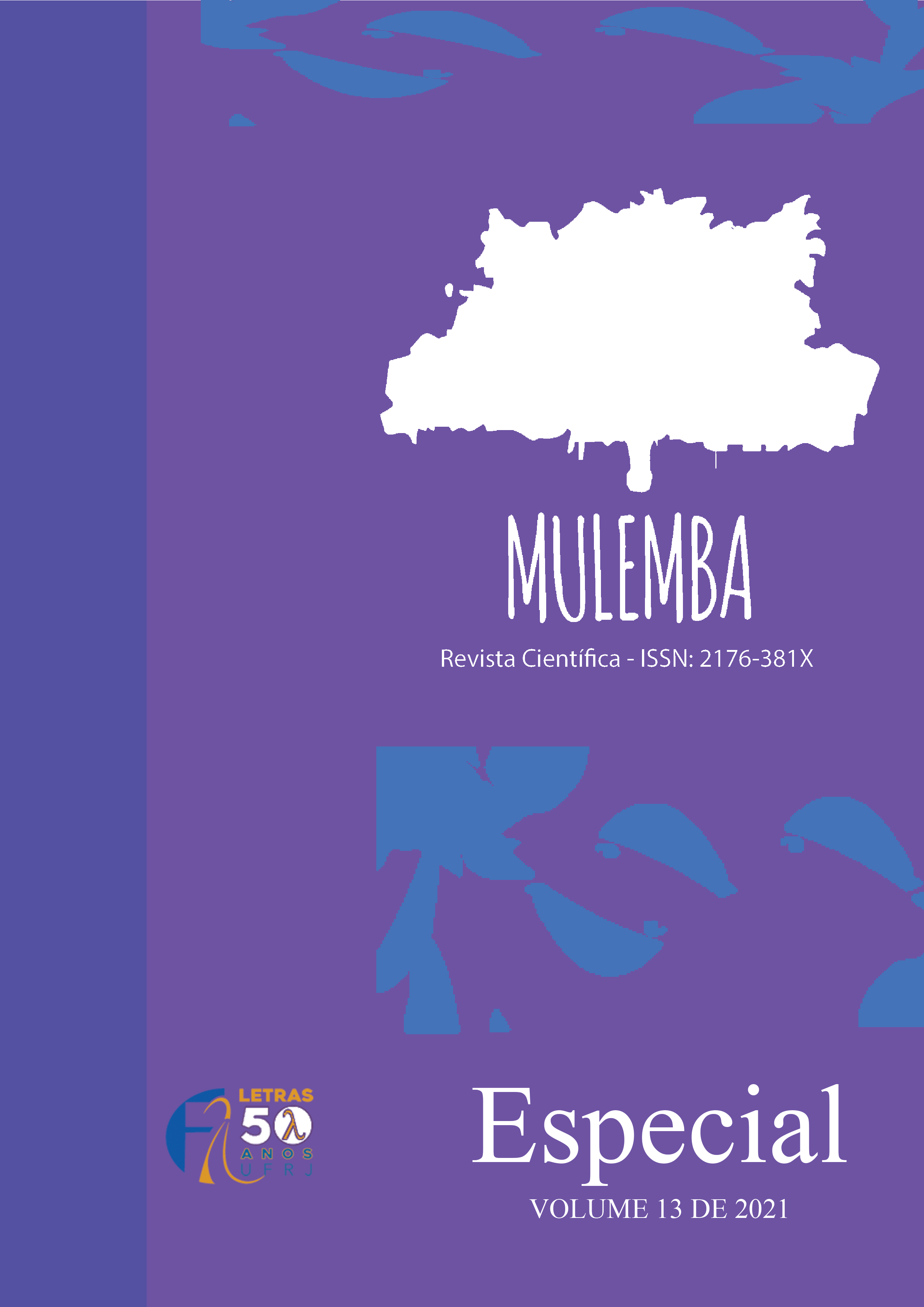A guerra santificada: violência e transformação do indivíduo no romance Patriotas, de Sousa Jamba
DOI:
https://doi.org/10.35520/mulemba.2021.v13nEsp.a51060Abstract
Este artigo tem como enfoque os bastidores da violência narrados no romance Patriotas, de autoria de Sousa Jamba. Partindo de uma leitura sociológica do texto ficcional, analisamos as práticas formativas transmitidas pelo movimento radical na constituição do guerrilheiro, sujeito que faz o uso da violência. O argumento central que mediou nossa leitura do romance é que o engajamento em movimentos radicais é gradual, envolvendo processos de socialização, incorporação de regras de comportamento e sentimento, rituais e conversões identitárias. No caso aqui analisado, enfocamos a trajetória de treinamento e socialização militar vivida pelo personagem principal do romance, Hosi Mbueti, na União Nacional para a Independência Total de Angola (UNITA) durante a Guerra Civil angolana, e os efeitos desta experiência sobre o indivíduo. Considerando a trajetória do autor, tomamos o romance como uma espécie de documento social para pensar a realidade objetiva vivida por guerrilheiros na UNITA e, por isso, contrastamos os elementos ficcionais com estudos sobre recrutamento e engajamento em movimentos armados, de um lado, e dados históricos coletados por pesquisadores sobre a UNITA, de outro.
References
ALBERTI, Verena. Literatura e autobiografia: A questão do sujeito na narrativa. Estudos Históricos, Rio de Janeiro, v. 4, n. 7, p. 66-81, 1991. Disponível em: http://bibliotecadigital.fgv.br/ojs/index.php/reh/article/view/2313, Acesso: 08 jan. 2021.
BECK, Teresa. The Normality of Civil War: Armed Groups and Everyday Life in Angola. Frankfurt: Campus Verlag, 2012.
CHAVES, Rita. O passado presente na literatura africana. Via Atlântica, n. 7, p. 147-161, 2004. DOI: <https://doi.org/10.11606/va.v0i7.49794>.
COLLINS, Randall. Interaction Ritual Chains. Princeton: Princeton University Press, 2004.
DASH, Leon de Costa. Savimbi’s 1977 Campaign Against the Cubans and MPLA – Observed for 7 ½ Months, and Covering 2.100 Miles Inside Angola. Pasadena: California Institute of Technology, 1977.
DELLA PORTA, Donatella. Social Movements, Political Violence, and the State: a comparative analysis of Italy and Germany. Cambridge: Cambridge University Press, 1995.
FANON, Frantz. On Violence. In: FANON, Frantz. The Wretched of the Earth. New York: Grove Press, 2004.
GOFFMAN, Erving. Manicômios, prisões e conventos. São Paulo: Editora Perspectiva, 1961.
GOODWIN, Jeff; PFAFF, Steven. Emotion Work in High-Risk social movements: managing fear in the U.S. and East German Civil Rights Movements. In: GOODWIN, Jeff; JASPER, James; POLLETTA, Francesca (Ed.) Passionate Politics. Chicago: University of Chicago Press, 2001.
HOCHSCHILD, Arlie. Emotion Work, Feeling rules, and social structure. American Journal of Sociology, n. 85, 1979.
HUNDEIDE, Karsten. Becoming a committed insider. Culture & Psychology, v. 9, n. 2, 2003. DOI: <https://doi.org/10.1177/1354067X0392001>.
JAMBA, Sousa. Patriotas. Lisboa: Edições Cotovia, 1991.
LIMA, Isabel Pires de. Em busca de uma nova pátria: o romance de Portugal e de Angola após a descolonização. Via Atlântica, n. 1, 1997. DOI: <https://doi.org/10.11606/va.v0i1.48677>.
LIMA, Luiz Costa. História, Ficção, Literatura. São Paulo: Companhia das Letras, 2006.
MACÊDO, Tania. Luanda: Violência e escrita. In: CHAVES, Rita; MACÊDO, Tania (Org.). Marcas da diferença: As literaturas africanas de línguas portuguesa. São Paulo: Alameda, 2006, p. 175-188.
MACÊDO, Tania. Luanda, cidade e literatura. São Paulo: Editora UNESP, 2008.
MATA, Inocência. Literatura e política em Angola, hoje: Uma leitura da produção ficcional contemporânea. Matraga, Rio de Janeiro, v. 19, n. 31, p. 25-44, jul./dez. 2012. Disponível em: <https://www.e-publicacoes.uerj.br/index.php/matraga/article/view/22595>. Acesso em 08 jan. 2021.
MESSIANT, Christine. Angola, les voies de l’ethnisation et de la décomposition (1ere partie). Lusotopie, n. 1, 1994, p. 155-210.
MINTER, William. Apartheid’s Contras. An inquiry into the roots of war in Angola and Mozambique. London: Zed Books, 1994.
MOURÃO, Fernando Augusto Albuquerque. A sociedade angolana através da literatura. São Paulo: Editora Ática, 1978.
PESTANA, Nelson. A história na estória em Angola: Henrique Abranches e José Eduardo Agualusa. In: CHAVES, Rita; MACÊDO, Tania (Org.). Marcas da diferença: As literaturas africanas de línguas portuguesa. São Paulo: Alameda, 2006, p. 227-242
SERRANO, Carlos. O romance como documento social: O caso de Mayombe. Via Atlântica, n. 3, dezembro 1999. DOI: <https://doi.org/10.11606/va.v0i3.49013>.
SOMMIER, Isabelle. La violence révolutionnaire. Paris: Presses de Sciences Po, 2008
SOMMIER, Isabelle. Engagement radical, désengagement et déradicalisation. Continuum et lignes de fracture. Lien social et Politiques, n. 68, 2012. DOI: <https://doi.org/10.7202/1014803ar>.
SUMMERS-EFFLER, Erika. Ritual theory. In: STETS, Jan; TURNER, Jonathan (Ed.). Handbook of the sociology of emotions. New York: Springer, 2007.
VITERNA, Jocelyn. Pulled, pushed and persuaded. Explaining women’s mobilization into the Salvadoran guerrilla army. American Journal of Sociology, v. 112, n. 1, p. 1-45, 2006. DOI: <https://doi.org/10.1086/502690>.
WOOD, Elisabeth. Insurgent Collective Action and Civil War in El Salvador. New York: Cambridge University Press, 2003.
WOOD, Elisabeth. The social processes of Civil War: the wartime transformation of social networks. Annual Review of Political Science, v. 11, p. 539-561, 2008. DOI: <https://doi.org/10.1146/annurev.polisci.8.082103.104832>.
Downloads
Published
Issue
Section
License
Authors who publish with this journal agree to the following terms:
- Authors retain copyright and grant the journal right of first publication with the work simultaneously licensed under a Creative Commons Attribution License that allows others to share the work with an acknowledgement of the work's authorship and initial publication in this journal.
- Authors are able to enter into separate, additional contractual arrangements for the non-exclusive distribution of the journal's published version of the work (e.g., post it to an institutional repository or publish it in a book), with an acknowledgement of its initial publication in this journal.
- Authors are permitted and encouraged to post their work online (e.g., in institutional repositories or on their website) prior to and during the submission process, as it can lead to productive exchanges, as well as earlier and greater citation of published work (See The Effect of Open Access).

